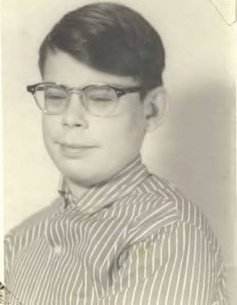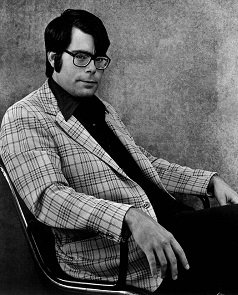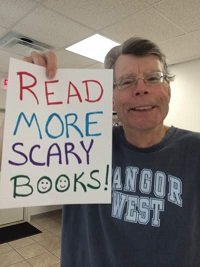The Open Book: Stephen King
It’s easy for literary snobs to dismiss Stephen King. After all, he just writes schlocky horror fiction. Clearly the man is nothing more than a hack, slapping together gory stories for the indiscriminate masses to lap up. Of course, nothing could be further from the truth. In fact, King’s book on writing, called in classic blunt style On Writing, is often listed by other writers as one of their favourite books. It’s part memoir, part guidebook and all a testament to the amount of work and attention he puts into his writing. Unsurprising, really, from a former English teacher.

King was raised by his mother (his father abandoned the family when King was an infant) who barely made ends meet, and this desperation of hand to mouth living infuses a lot of his work. His family didn’t have a television until he was eleven, something he considers a key factor in his perspective on modern culture. He worked his way through university, married a fellow English student and became an English teacher at a high school (after a stint working for minimum wage in a laundry), all in his native state of Maine. He supplemented his income by writing and selling short stories. One day, after some thoughts had been bouncing around in his head for a few years, he sat down and wrote the first three pages of a story about a bullied high school girl being victimised by her fellow pupils when her first period started in the showers after gym class. Overcome by self-doubt, he crumpled the pages up and threw them away. The next day his wife set the pages, retrieved from the trash, in front of him. She wanted to know how the story ended.
The story grew into the novel Carrie, a dark tale about a girl with psychic powers. 30 publishers rejected it before it was accepted by Doubleday and published in April of 1974. King got a $2500 advance on it, which he considered a pretty impressive amount of money, though the hardback didn’t sell particularly well. Then he got a phone call telling him the paperback rights had been sold for $400,000, half of which went to King. It was, as he later commented, probably more money than his mother had earned in her life. The book went on to sell over a million copies, and two years later became a film that made over $30 million at the box office. Stephen King had arrived.

This change in his life was accompanied by another more tragic one. His mother passed away of cancer shortly after the novel’s release. King himself was also fighting a battle – he’d been a functioning alcoholic for a few years, and the whirlwind of his life in these years only worsened the problem. He would later admit that he was drunk when he gave his mother’s eulogy, and had to hold onto the podium to avoid collapsing. It’s impossible not to see a self portrait in the main character of The Shining, Jack Torrance, an alcoholic writer. King later admitted that the character’s violent actions towards his son were his way of dealing with his own occasional antagonistic feelings towards his children, and his fear that he might act upon them. Around this time he also invented an alter ego, Richard Bachman, as his publishers didn’t want to publish more than one book a year from him. Bachman was also, in part, his way of proving to himself that his success was due to skill rather than luck. [1] The Bachman books enjoyed moderate success, and by 1985 King was pretty sure that the fifth book under the name, Misery, was going to be as big as anything else he’d written. Before it was released, an eagle-eyed bookstore clerk in Washington DC named Steve Brown noticed the similarities in writing style and did some digging in the Library of Congress. When he confronted King’s publishers, King decided to let Brown interview him and write an exclusive on the pseudonym as a reward for his detective work. Misery was released under King’s own name, and was of course a massive success.
By that time King was facing his own personal demons head on. His alcoholism had expanded to include first prescription medication, and then cocaine. His condition was so bad that there’s one book written during this period, Cujo, that he admits to barely remembering writing at all. Another, The Tommyknockers, features a protagonist who is being killed by his addictions (which mirror King’s own), while those around him morph into unrecognisable alien creatures. It was the last novel King wrote before he “went clean”, which may explain why it’s his least favourite of his works. In 1988 his wife staged an intervention, after she found him passed out in a pile of vomit next to his desk. To his great credit, he’s remained clean and sober to this day. The greatest risk to his sobriety came when he found himself unable to write while sober, though eventually his gift returned. Unsurprisingly the first novel he wrote, Needful Things, has as its core the theme of people being seduced by being offered the thing they desired most in the world, and it’s clear that writing was that for King. A later novel, Bag of Bones, revisited this period of writer’s block in King’s life and revealed (through a fictional protagonist who uses the same trick) that he had hidden it from the world by giving his publishers novels he had previously written and “banked” to publish.

King continued to write throughout the 1990s, winning critical acclaim with non-genre tales like The Shawshank Redemption and The Green Mile. On June 19th, 1999, his writing career (along with his life) nearly came to a sudden end. He was walking along the hard shoulder of a road in Maine when a driver, distracted by a dog in the back of his van, struck him so hard that he flew fourteen feet away from the road. King survived, though he was severely injured, and it was while in hospital that he finished On Writing as well as writing the novel Dreamcatcher. It may have been inspired by parallels between his own hospitalisation and that of his mother in her final days, as it’s a book ostensibly about alien invasion that turns out to be a pretty clear metaphor for cancer. Once released from hospital King continued to be in pain for several years, and in 2002 he announced his intention to retire from writing. Since then he has released fifteen more novels, as well as six novellas and three collections of short stories. Several have been accompanied by the statement that this was definitely his last one, but it’s clear that writing has its hooks so far into him that he’s unable to stop. Nor would we, the selfish public, ever really want him to.
Banner shows King writing the Shining and is via Biography.com.
[1] A similar motivation led his son (Joseph Hillstrom King) to release his novels as Joe Hill and not confirm his connection to King until 2007, ten years into his writing career.

